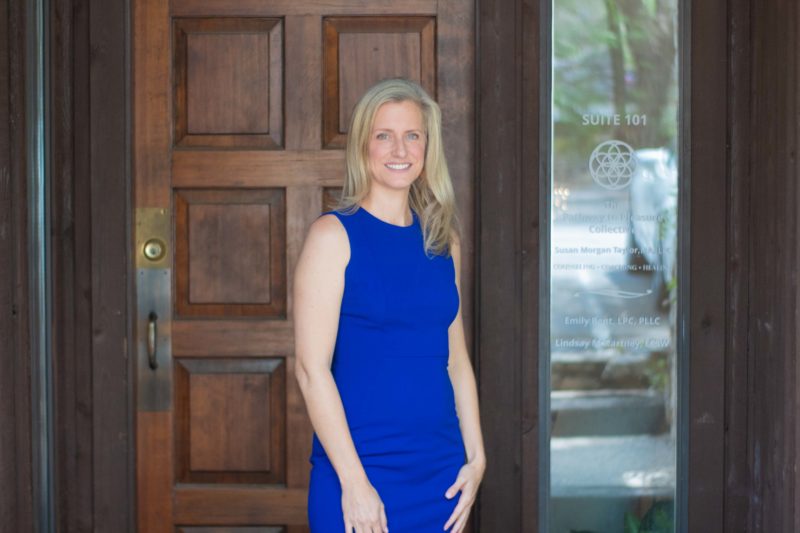Sexuality in the Age of COVID

Customers walk into Forbidden Fruit on April 20, 2021, in Austin, Texas. Divina Ceniceros Dominguez/Reporting Texas
The COVID-19 pandemic has forced many people to spend a large amount of time alone, and more and more people have turned to sex therapists to explore their sexuality.
In Austin, sex therapists say many people assigned female at birth have used the unexpected alone time to dive into their desire to please themselves, explore new aspects of their sexuality and work on their relationships with their partners and with themselves.
Tiffany Stanley, who has a Ph.D in clincial sexology and is a certified sex therapist based in Austin, said her clientele has grown since the start of the pandemic.
“I’ve definitely seen an increase in the interest about sex. People are not just curious about self pleasure, but also addressing what’s not working,” Stanley said. “I’ve got a mixture of clients that are new clients, existing clients and couples, who are wanting to understand what’s working, what’s not working and what they can do differently.”
Stanley says clients have come to her saying, “I’m not satisfied with my personal pleasure, or my sexual relationship with my partner or partners, and I’m kind of tired of it.”
As the pandemic continues to rage, couples have been locked inside together and forced to confront deep rooted issues in their relationships, said Susan Morgan Taylor, the founder of the Pathway to Pleasure Collective, an Austin organization that provides advice and empowerment through sexuality.
“For them, what’s happening is all those issues that have not been addressed for so long, because they are spending so much time together at home, are all really bubbling to the surface,” Taylor said. “People are finally really at a breaking point where it’s like, ‘We need to get some help for this or we’re not going to be together within a year.’”
Exploring and knowing one’s sexuality is a vital step in not only forming healthy relationships with oneself but with partners as well. Yet many people are nervous to take that first step due to their own fears and stigmas that society has thrown upon people assigned female at birth, Taylor said.
“I think a lot of people just don’t even know where to start … With male-bodied people, their genitals are external. So from in utero, male-bodied individuals are touching themselves and masturbating … it’s external and seen so it is more accepted as part of a boy’s growth and development,” Taylor said.
But females, Taylor said, “because our anatomy is inside, it is more hidden. There’s less social acceptance for women exploring their own bodies.”
Those internal obstacles, combined with societal and external obstacles, can prevent women from feeling empowered and exploring their own sexuality, Taylor said.
Stanley added: “The best thing you can do is just talk about it. Of course, there’s appropriate spaces, time, people to have conversations about sex and masturbation — but it’s so natural.”

Licensed sex therapist Susan Morgan Taylor stands outside her office on April 26, 2021, in Austin, Texas. She is the founder of The Pathway to Pleasure Collective and the Feminine Wisdom Academy. Divina Ceniceros Dominguez/Reporting Texas
There are also physical benefits to orgasm beyond simple physical pleasure, Stanley said.
“It’s usually helpful for our blood flow, it’s great for our skin and heart. It’s wonderful … Even just pleasure feels really good,” Stanley said. “During that moment and you are with yourself embracing your own body, there are so many good positive things that come from that. That is another important piece that sometimes gets overlooked.”
American society has grown slowly in terms of sexual expression but there is still much work to be done, said Samar Poorlakani, a sex-positive psychotherapist of Austin Intimate Matters.
“There’s so much purity culture. It’s 2021 and sex is still taboo, even though we use it for everything,” Poorlakani said. “It’s in all of our advertising but when it comes to each person, especially for people who are raised as women, we’re taught from a very young age that all of that’s wrong, sinful and it’s for reproduction and not pleasure.”
People assigned female at birth are bombarded with conflicting messages about their sexuality, she said
“We’re barked at constantly. We’re told to cover up and show less skin but we’re also told to loosen up, wear something sexy and embrace yourself,” Poorlakani said. “Wear a rape whistle but don’t go anywhere alone … It’s just a lot of mixed messages.”
Despite these obstacles, there are still first steps that people assigned female at birth can take in order to begin their sexual exploration but combat these often negative feelings, said Claudia Thompson, a certified sex and sex addiction therapist at Austin’s Enhancing Intimacy.
She recommends that clients read books such as “Pleasure Activism: The Politics of Feeling Good” by Adrienne Maree Brown and “TrainWreck: The Women We Love to Hate, Mock, and Fear . . . and Why” by Sady Doyle, which explain how females “fit in society, what’s happened to them historically around their sexuality, and how their desire, need and right for pleasure has been managed by society,”Thompson said.
Studying how societal pressures influence sexuality can help people learn “maybe why they think certain things and give them the chance to rethink things for themselves,” Thompson said.
Poorkalani suggested that people “start at yourself — the core of your being. We’re all wired to connect. Nobody wants to feel alienated, isolated, weird, or uncomfortable. Just combating those feelings of shame around sexuality.”
Being able to own one’s body, focus on themselves and what makes them happy is a major component of expressing sexuality, Taylor said. But societal change is also necessary, she said, and that starts with the individual.
“If we want to change the collective, we have to start, I believe, really at a grassroots level with women taking a stand for themselves and for learning about their own bodies and how their sexuality works,” Taylor said.
“We have to catch ourselves when we are having those thoughts and question, ‘Why am I having that thought right now? Is that a thought that I choose to have or is this something that I’ve inherited maybe from my family of origin, my culture, society … why am I thinking and feeling this right now?’ Taylor added. “We can question that and make a new choice if that’s something I choose to continue to believe.”
In a world that constantly has a judging eye, it is important to remain true to yourself and your sexuality, Poorlakani said.
“No matter what you do, someone will criticize you. Whatever you do, someone will have an opinion about it. There’s no way you can please anyone. So why not please yourself?” Poorlakani said. “Just encouraging all of my clients of all genders to be radically authentic, and then in that authenticity, truth and space, you’ll feel safer to explore your sexuality, identity, behaviors, interests, desires, etc.”